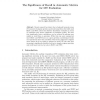Free Online Productivity Tools
i2Speak
i2Symbol
i2OCR
iTex2Img
iWeb2Print
iWeb2Shot
i2Type
iPdf2Split
iPdf2Merge
i2Bopomofo
i2Arabic
i2Style
i2Image
i2PDF
iLatex2Rtf
Sci2ools
AMTA
2004
Springer
2004
Springer
The Significance of Recall in Automatic Metrics for MT Evaluation
Recent research has shown that a balanced harmonic mean (F1 measure) of unigram precision and recall outperforms the widely used BLEU and NIST metrics for Machine Translation evaluation in terms of correlation with human judgments of translation quality. We show that significantly better correlations can be achieved by placing more weight on recall than on precision. While this may seem unexpected, since BLEU and NIST focus on n-gram precision and disregard recall, our experiments show that correlation with human judgments is highest when almost all of the weight is assigned to recall. We also show that stemming is significantly beneficial not just to simpler unigram precision and recall based metrics, but also to BLEU and NIST.
| Added | 20 Aug 2010 |
| Updated | 20 Aug 2010 |
| Type | Conference |
| Year | 2004 |
| Where | AMTA |
| Authors | Alon Lavie, Kenji Sagae, Shyamsundar Jayaraman |
Comments (0)

